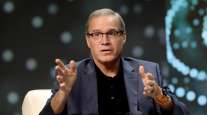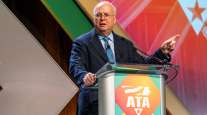Senior Reporter
Spear to Lead First MCE as ATA President, Will Outline Vision for Federation's Future

This story appears in the Sept. 12 print edition of Transport Topics.
Trucking leaders are gathering in a familiar city for American Trucking Associations’ Management Conference & Exhibition, but the annual meeting will have a new feel as the federation moves forward under new leadership.
Chris Spear, who became ATA’s president in July, will continue to introduce himself and his vision to industry executives during the conference, which runs Oct. 1-4 in Las Vegas, MCE’s host city for the fourth time since 2004.
“We know ATA’s members are leaders in this industry,” Spear said. “MCE is the perfect place, not just to demonstrate that leadership, but to learn from fellow industry leaders about the new and exciting directions trucking and our association are headed.”
Spear succeeded Bill Graves, the former governor of Kansas who led ATA for more than 13 years.
In his “State of the Industry” address on Oct. 3, Spear is expected to outline ATA’s objectives, including a focus on realizing greater legislative victories in Congress and around the country.
“My vision is very simple. It’s to win, flat-out,” Spear said.
He also emphasized the importance of demonstrating that ATA is “truly the representation of the entire industry.”
“That’s key,” Spear said. “It’s what makes us unique.”
Topping ATA’s list of priorities this year is to push congressional leaders to send to the White House legislation that would establish a permanent suspension of the hours-of-service restart rule, as well as a clarification of a 1994 aviation law on the state meal and rest break regulations, he said.
“The real challenge for ATA is the dysfunction in Washington,” Spear added. “We have too few opportunities, fewer bills, fewer opportunities to amend, less oversight, more regulations coming out that are unchecked.”
This dysfunction in Washington has led to inaction on adopting long-term, sustainable funding programs for roads and bridges, he said.
In recent interviews, Spear also has frequently addressed the subject of autonomous vehicle technology, which he said represents a lot of value for the industry but also “a lot of unknowns.”
“My concern is that we need to get to the table and drive a lot of that outcome, and not concede it to another mode of transportation,” he said. “You’re going to see us really getting more aggressive in terms of where we position the industry on these issues to make sure we don’t inherit a regulatory framework that we weren’t a part of designing.”
Autonomous-driving vehicles and platooning will also be the topic of an MCE general session on Oct. 4 led by Transport Topics.
This session will look at how advances in automated driving could increase safety and efficiency in trucking while examining potential obstacles for the technology, such as earning the trust of the motoring public.
The discussion will feature Peloton Technology Inc. co-fouder and CEO Josh Switkes; Sean Waters, director of compliance and regulatory affairs of Daimler Trucks North America; Michael Roeth, executive director of the North American Council for Freight Efficiency; and Jude Hurin, administrator of the management services and programs division at the Nevada Department of Motor Vehicles, which has allowed testing of autonomous trucks. It will be moderated by TT Editorial Director Neil Abt.
Scott Darling, administrator of the Federal Motor Carrier Safety Administration, is set to address MCE on Oct. 3.
Darling has pledged to work with the industry on hours of service and other safety issues.
In August, FMCSA and the National Highway Traffic Safety Administration issued a joint proposal that would require heavy-duty vehicles to be equipped with devices that limit their speeds on U.S. roads.
FMCSA also launched a safety campaign this summer reminding motorists to check for blind spots, avoid close distances when merging ahead of trucks and be aware that larger vehicles require extra room when turning.
Other events at MCE include an overview of the U.S. economy and its effect on trucking presented by Diane Swonk, founder and CEO of DS Economics, and Bob Costello, ATA’s chief economist; a national political update by Peter Hart of Hart Research Associates and Neil Newhouse of Public Opinion Strategies; and a host of leadership, educational and policy sessions and awards.
Last year, Newhouse unveiled polling results that found strong public support for federal investment in highway infrastructure.
Rounding out the field of speakers are John Bozzella, CEO of the Association of Global Automakers; Andrew Card, former White House chief of staff and president of Franklin Pierce University; and Kent Lindner, senior vice president and chief operating officer of consumer risk analytics at Bank of America.
The conference ends with a banquet, at which Grammy Award-winning rocker John Fogerty will perform.
“MCE annually features one of the most impressive programs of any major trucking event, and this year is no different,” said Pat Thomas, ATA chairman and senior vice president of state government affairs for UPS Inc. “I would encourage anyone in our industry — member or not — who is serious about the future of trucking to join us this year in Las Vegas.”
Educational sessions at the conference will address electronic logging devices, the technician shortage, state regulations, food safety shipping regulations, natural gas-powered trucks, the fight against human trafficking and the internet of things.
Spear also will open MCE’s exhibit hall, a showcase of trucks, trailers, components, technologies and services designed to help carriers operate safely and efficiently.
Prior to rejoining ATA as the federation’s president, Spear was vice president of the government affairs unit at Hyundai Motor Co. He had been at ATA from March 2014 through September 2015. For those who’ve never met him, Spear said he’d like them to know he’s more than just a lobbyist. He was raised in Nebraska, where he accompanied his father at work in the cab of a truck. He also wants people to know he’s a family man, approaching his 25th wedding anniversary, and has four children. He relates to the hard-working people who transport America’s freight.
“Family-led and family-owned businesses: I think these are exactly what define this industry. And I think they’re very relevant. That’s what makes our story so special,” he said.




